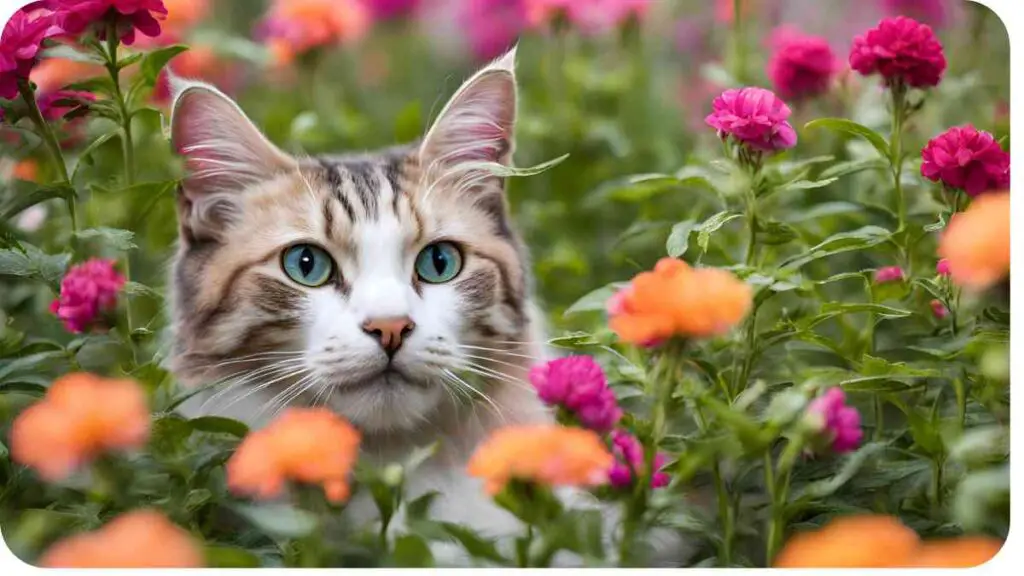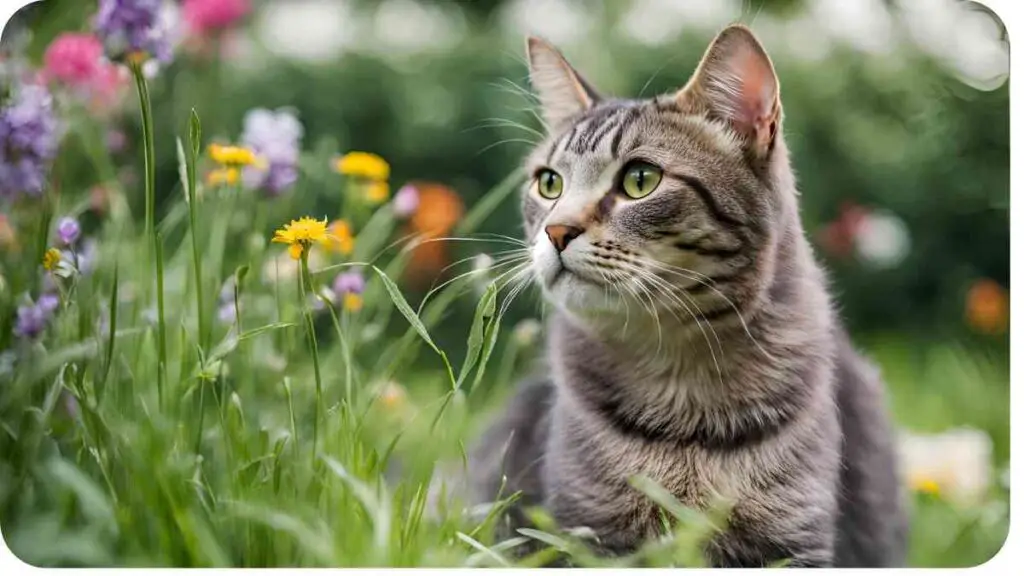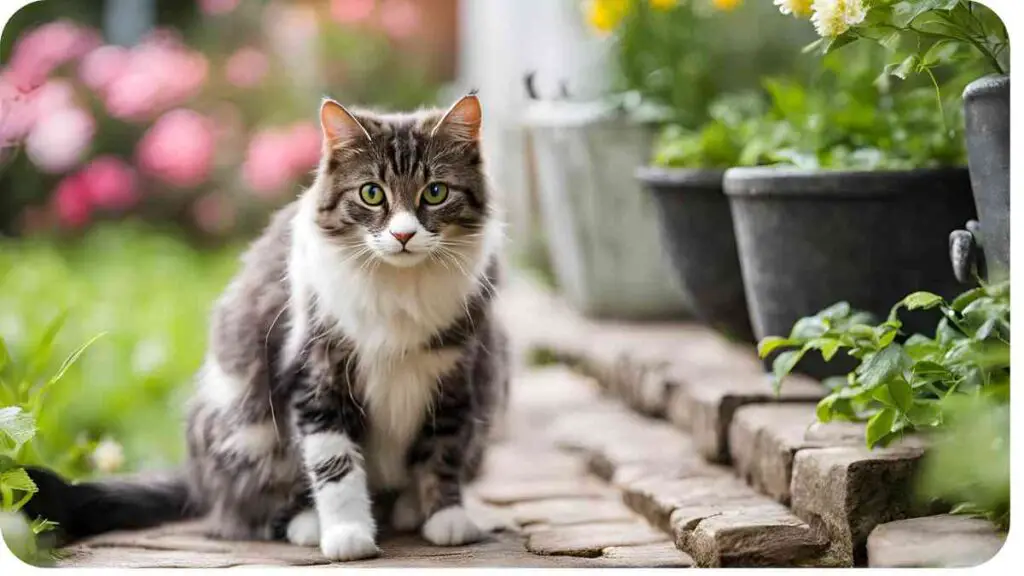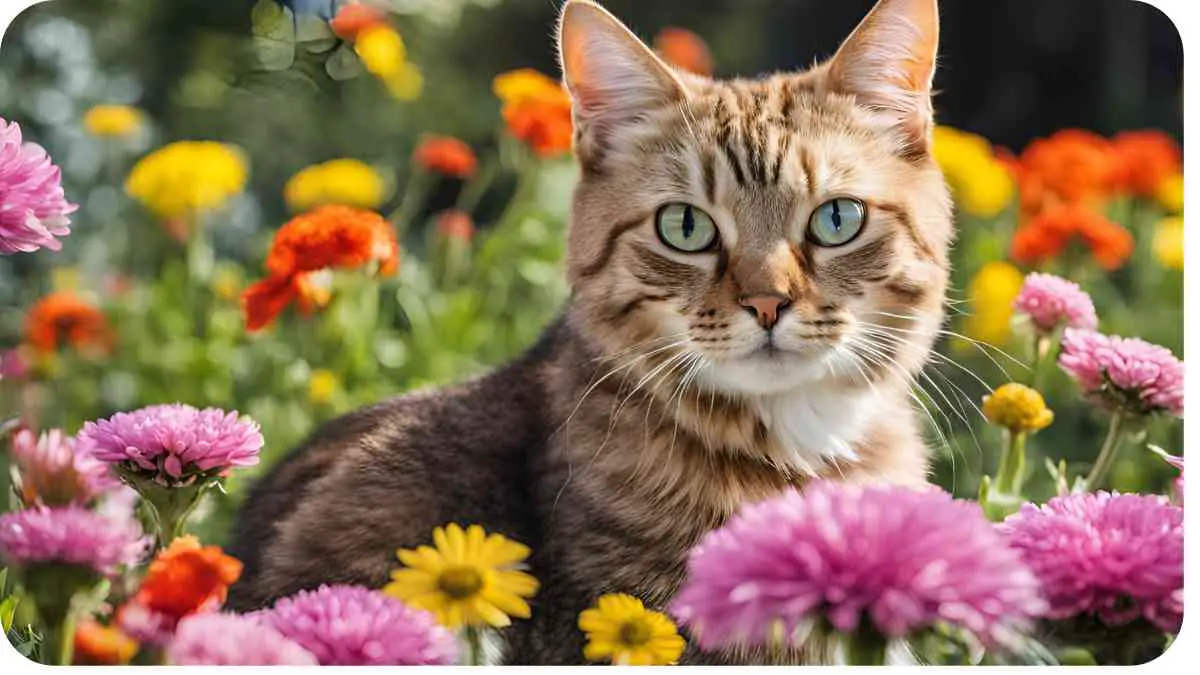Are you tired of finding your carefully tended flower beds turned into litter boxes by neighborhood cats? You’re not alone. Many gardeners face the challenge of keeping cats out of their gardens. But fear not! In this comprehensive guide, we’ll explore various strategies and techniques to help you reclaim your flower garden from feline invaders.
| Key Takeaways |
|---|
| 1. Understanding why cats are drawn to gardens |
| 2. Utilizing natural deterrents such as citrus peels and coffee grounds |
| 3. Implementing physical barriers like chicken wire fencing |
| 4. Exploring scent repellents such as citronella and vinegar |
| 5. Considering sound deterrents like ultrasonic repellers |
| 6. Using water solutions like motion-activated sprinklers |
| 7. Selecting cat-resistant plants for your garden |
| 8. Creating distractions to divert cats’ attention |
| 9. Maintaining your garden regularly to deter cats |
| 10. Exploring additional resources for further reading |
2. Understanding Why Cats Enter Flower Gardens

Before we delve into solutions, let’s understand why cats are drawn to flower gardens in the first place. Cats are naturally curious creatures, and gardens provide them with an enticing environment full of intriguing sights, sounds, and smells. Additionally, gardens offer soft soil for digging and hunting opportunities for small creatures like insects and rodents.
Discover effective methods to deter feline intruders with our guide on how to keep cats out of your flower beds. From natural deterrents to physical barriers, safeguard your flower beds and enjoy a pristine garden sanctuary.
Harm Caused by Cats in Gardens
Cats may seem harmless, but their presence in your flower garden can lead to several problems:
- Damage to Plants: Cats may trample delicate flowers, uproot seedlings, or chew on leaves and stems.
- Litter Box Behavior: Cats may use your garden as a litter box, leaving unpleasant odors and unsightly messes.
- Predation: Cats are natural hunters and may prey on birds, butterflies, and other wildlife that visit your garden.
- Spread of Diseases: Cat feces can harbor harmful parasites and pathogens, posing health risks to humans and other animals.
Now that we understand the challenges posed by cats in gardens, let’s explore effective strategies for keeping them at bay.
4. Natural Deterrents
Natural deterrents leverage scents, textures, and plants to discourage cats from entering your garden.
Table: Natural Deterrents for Keeping Cats Out
| Natural Deterrent | Description | Effectiveness Rating (Out of 5) |
|---|---|---|
| Citrus Peels | Citrus-scented peels scattered around the garden | 3.5 |
| Coffee Grounds | Sprinkling used coffee grounds around plants | 4.0 |
| Rosemary | Planting rosemary bushes as a natural repellent | 4.5 |
| Lavender | Planting lavender to deter cats with its aroma | 4.0 |
5. Physical Barriers
Physical barriers create obstacles that prevent cats from accessing your flower garden.
Eliminate rodent nuisances from your garden with insights from our article on how to get rid of rats in your flower beds. Implement strategic measures to protect your flowers and maintain a pest-free outdoor space year-round.
Table: Types of Physical Barriers and Their Effectiveness
| Physical Barrier | Description | Effectiveness Rating (Out of 5) |
|---|---|---|
| Chicken Wire Fencing | Installing chicken wire fencing around garden borders | 4.5 |
| Spiky Mats | Placing mats with sharp spikes on garden paths | 3.5 |
| Garden Netting | Covering flower beds with garden netting | 4.0 |
| Cat-Proof Garden Gates | Installing gates with small gaps or cat-proof latches | 4.0 |
Physical barriers provide a reliable defense against cats, especially when combined with other deterrent methods.
6. Scent Repellents

Scent repellents use strong odors that cats find unpleasant to discourage them from entering your garden.
Table: Common Scent Repellents and Their Effectiveness
| Scent Repellent | Description | Effectiveness Rating (Out of 5) |
|---|---|---|
| Citronella | Spraying citronella oil around garden perimeters | 3.5 |
| Vinegar Solution | Mixing vinegar and water to create a repellent spray | 4.0 |
| Garlic Spray | Using garlic-infused water to deter cats | 3.0 |
| Ammonia | Placing ammonia-soaked rags in strategic locations | 3.5 |
These scent repellents create an olfactory barrier that discourages cats from entering your garden.
7. Sound Deterrents
Sound deterrents emit ultrasonic frequencies or loud noises that cats find irritating, deterring them from the area.
Explore safe and effective weed control solutions tailored for your flower beds in our guide on what kind of weed killer can you use in flower beds?. Preserve the beauty of your garden while keeping unwanted pests and plants at bay.
Table: Sound Deterrent Devices for Keeping Cats Away
| Sound Deterrent Device | Description | Effectiveness Rating (Out of 5) |
|---|---|---|
| Ultrasonic Repellers | Emitting high-frequency sound waves to repel cats | 4.0 |
| Motion-Activated Alarms | Triggering loud alarms when cats enter the garden | 3.5 |
| Sonic Garden Stake | Emitting sonic pulses to deter cats | 3.0 |
| Wind Chimes | Producing random noises in response to wind | 2.5 |
Sound deterrents provide a non-invasive way to keep cats away from your flower garden without causing harm.
8. Water Solutions
Water-based deterrents use water to startle cats and discourage them from entering your garden.
Table: Water-Based Deterrents and Their Effectiveness
| Water-Based Deterrent | Description | Effectiveness Rating (Out of 5) |
|---|---|---|
| Motion-Activated Sprinklers | Spraying water when cats approach garden areas | 4.5 |
| Spray Bottles | Spraying cats with water when they enter the garden | 3.5 |
| Garden Hose | Using a hose to drench cats in the garden | 4.0 |
| Water Balloons | Throwing water balloons at cats to deter them | 3.0 |
Water solutions offer an effective and humane way to deter cats while also providing hydration for your plants.
9. Plant Selection
Strategic plant selection can deter cats from entering your garden by choosing varieties that cats find unappealing or difficult to access.
Table: Cat-Resistant Plants for Your Garden
| Cat-Resistant Plants | Description | Characteristics |
|---|---|---|
| Marigolds | Emitting a strong odor that cats dislike | Bright, colorful flowers |
| Coleus | Having fuzzy leaves that cats find unpalatable | Variegated foliage |
| Geraniums | Producing a scent that repels cats | Colorful blooms |
| Rue | Releasing a pungent odor that cats avoid | Herbaceous perennial |
Choosing cat-resistant plants not only beautifies your garden but also creates a natural deterrent against feline intruders.
10. Creating Distractions

Distracting cats with alternative attractions can redirect their attention away from your flower beds.
Prepare your flower beds for the upcoming growing season with expert tips from our comprehensive article on how to clean flower beds after winter. Learn proper maintenance techniques to revitalize your garden and ensure vibrant blooms throughout the year.
Table: Distraction Techniques to Divert Cats from Your Garden
| Distraction Technique | Description | Effectiveness Rating (Out of 5) |
|---|---|---|
| Outdoor Cat Toys | Placing interactive toys in designated play areas | 4.0 |
| Catnip Plant | Growing catnip in a separate section of the garden | 3.5 |
| Sandboxes | Providing sandboxes for cats to dig and play | 4.0 |
| Bird Feeders | Installing bird feeders to attract cats’ prey | 3.5 |
Creating distractions not only keeps cats entertained but also reduces their interest in exploring your flower garden.
11. Maintenance Tips
Regular maintenance of your garden can also help deter cats and maintain its overall health and appearance.
- Remove Cover: Clear away dense foliage and debris where cats may hide or feel protected.
- Cover Bare Soil: Mulch bare soil to discourage cats from digging and using it as a litter box.
- Clean Regularly: Remove cat feces promptly to prevent lingering odors and discourage repeat visits.
- Monitor for Intruders: Keep an eye out for neighborhood cats and take proactive measures to deter them from entering your garden.
By following these maintenance tips, you can create an environment that is less inviting to cats and more conducive to healthy plant growth.
Embark on the journey of creating a stunning flower garden from scratch with our detailed guide on how to make a flower garden from scratch. From site selection to plant selection, cultivate your dream garden oasis with confidence and creativity.
12. Conclusion
Keeping cats out of your flower garden may require a combination of strategies tailored to your specific needs and preferences. By understanding why cats are drawn to gardens and implementing effective deterrent methods, you can enjoy a beautiful and cat-free outdoor space.
Remember to be patient and persistent, as deterring cats may require ongoing effort and experimentation. With time and dedication, you can successfully protect your flower garden from feline intruders.
Further Reading
Here are some additional resources for further reading on keeping cats out of your flower garden:
- The Spruce: Keep Cats Out of Flower Beds: Offers practical tips and solutions for deterring cats from flower beds.
- Neighborhood Cats: Keeping Cats Out of Gardens and Yards: Provides insights into humane methods for keeping cats out of outdoor spaces.
- House Beautiful: How to Keep Cats Out of the Garden: Offers creative ideas and solutions for preventing cats from entering gardens.
These resources offer valuable information and tips to help you effectively keep cats out of your garden and enjoy a cat-free outdoor space.
FAQs
How can I naturally deter cats from my garden?
Using plants like lavender and rosemary or scent repellents like citrus peels can naturally deter cats due to their strong odors that cats find unpleasant.
Are there any motion-activated devices that are safe for cats?
Yes, motion-activated devices such as sprinklers are designed to startle cats without causing harm, providing a safe and effective deterrent option.
Will physical barriers harm cats?
No, physical barriers like chicken wire fencing and garden netting are designed to prevent cats from entering garden areas without causing harm to the animals.
Can I train my own cat to stay out of the garden?
Yes, you can train your own cat to stay out of the garden by creating alternative play areas, providing distractions, and using positive reinforcement techniques.
How often should I refresh scent repellents in my garden?
Scent repellents should be refreshed regularly, especially after rainfall, to maintain their effectiveness in deterring cats from entering your garden.

For 15 years, Hellen James has worked in the gardening industry as an expert and landscape designer. During her career, she has worked for a variety of businesses that specialize in landscaping and gardening from small firms to large corporations.

